Activated on Dec. 1, 1982 as the 22nd Marine Amphibious Unit (MAU), the 22nd Marine Expeditionary Unit (MEU) has had an impressive operational history and continues to serve as an expeditionary force in readiness.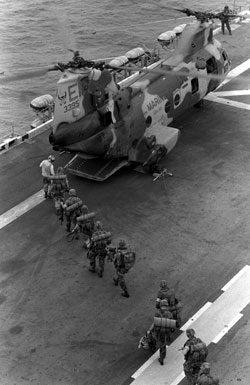
The MEU's activation was the redesignation of the 32nd MAU, a unit that regularly deployed to the Mediterranean and Caribbean regions for more than 20 years. On its final deployment, the MAU evacuated the Palestine Liberation Organization from Beirut, and was the first American unit to serve in the multi-national peace-keeping force in Lebanon.
On 22nd MAU’s maiden deployment, it again visited Beirut where the Marines and Sailors served until May 1983, and began preparing for a third deployment to Lebanon upon its return to the United States. On Oct. 18, 1983, the MAU departed the United States, and less than two days into its trans-Atlantic voyage it was diverted to the southern Caribbean.
On Oct. 25, 1983, the MAU participated in Operation URGENT FURY, the invasion of the island of Grenada, which was at that time, the largest U.S. military operation since the Vietnam War. The 22nd MAU conducted numerous helicopter and surface landings over three days and occupied 75 percent of the island; though the Marines constituted less than 20 percent of the total invasion force.
By Nov. 2, of that same year, the unit transited to Beirut where it landed later that month. The MAU remained ashore until late February of 1984, when the mission drew to a close, and evacuated hundreds of American citizens from the country.
Throughout the rest of the 1980s, the 22nd MAU deployed on a rotation basis with the 24th and 26th MAUs, participating in numerous contingency operations and exercises. In 1986, the 22nd MAU was the third unit to deploy with the 'Special Operations Capable' designation. On Feb. 5, 1988, the word 'Amphibious' was replaced with 'Expeditionary' to reflect the Marine Corps' changing role in national defense and theater security.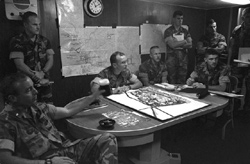
In May 1990, the 22nd MEU arrived off the coast of civil war torn Liberia in western Africa. The unit remained at sea until Aug. 2 which the Marines went ashore to reinforce the U.S. Embassy in Monrovia and evacuated U.S. citizens and designated third-country nationals. The MEU evacuated more than 1,600 civilians over the course of the next several weeks, until the 26th MEU arrived to provide relief.
The following deployment the MEU participated in the first combined arms exercise in Kuwait following operations DESERT SHIELD and DESERT STORM. Conflict in the Balkans kept the MEU busy during subsequent deployments as the unit participated in operations PROVIDE PROMISE, DENY FLIGHT and SHARP GUARD. In 1993, the MEU also served during the United Nations’ mission to Somalia.
The MEU's deployments in 1996 and 1997 focused on West Africa as it answered the call to conduct reinforcement and evacuation missions in Liberia, Zaire, the Central African Republic, the Republic of Congo and Sierra Leone. Additionally, the MEU continued to support Balkans peace-enforcement operations and conducted a non-combatant evacuation operation (NEO) in Albania.
In 1998, the 22nd MEU served in Bosnia and Kosovo, and was prepared to support operations in both Albania and Africa. The MEU was again deployed at the turn of the millennium when it served as a ‘Y2K’ contingency force, and also returned to the Balkans. The MEU later returned to Kosovo in 2001.
During the MEU’s 2002 deployment the unit took part in several anti-terrorism missions in Afghanistan and Pakistan and launched life-saving humanitarian efforts in the African nation of Djibouti.
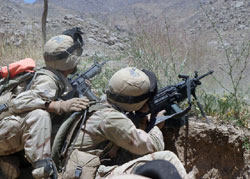 The 22nd MEU's 2004 deployment took place in Afghanistan where they established Forward Operating Base Ripley in the remote Oruzgan Province. For four months, the MEU carried out an aggressive campaign against Taliban and anti-coalition factions in the area where senior Army officials considered it the most successful campaign in the history of Operation ENDURING FREEDOM.
The 22nd MEU's 2004 deployment took place in Afghanistan where they established Forward Operating Base Ripley in the remote Oruzgan Province. For four months, the MEU carried out an aggressive campaign against Taliban and anti-coalition factions in the area where senior Army officials considered it the most successful campaign in the history of Operation ENDURING FREEDOM.
Marines and sailors of the 22nd MEU deployed to Iraq in 2005-2006 and battled insurgents from a forward operating base in and around the ancient city of Hit. While Battalion Landing Team, 1st Battalion, 2nd Marine Regiment, conducted combat operations against insurgents, MEU Service Support Group-22 worked to provide a better environment for Iraqi citizens and fixed roads and other critical infrastructure in the area. During this time, the MEU participated in 14 named operations and uncovered vast quantities of insurgent arms, ammunition and ordnance.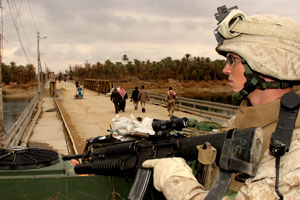
The MEU's 2007-2008 deployment brought the unit to the Bay of Bengal where Marines and sailors conducted humanitarian relief operations after Tropical Cyclone Sidr struck eastern India and Bangladesh. The MEU also supported counter piracy operations off the east coast of Africa and stood ready to support contingency operations in the Arabian Gulf. Before departing the area, the 22nd MEU supported President George W. Bush's visit to Israel and provided aviation lift for the President's support personnel.
In 2009, the MEU conducted numerous Theater Security Cooperation events in Europe and the Middle East during a deployment to the U.S. European Command and Central Command. In Europe, the Marines trained in Bulgaria and Greece. The 22nd MEU also made history in May when it was the first MEU to deploy with the MV-22B Osprey tilt-rotor aircraft. During workups, the MEU experimented with different employment techniques to understand and utilize the full capability of the aircraft.
The MEU conducted four separate Theater Security Cooperation events with Middle Eastern partners to build positive relationships between militaries and strengthened regional security. Near the end of the deployment, the MEU directly supported Operation ENDURING FREEDOM by transferring MV-22B tilt-rotor aircraft to forces on the ground, marking the first time the aircraft would support operations in Afghanistan.
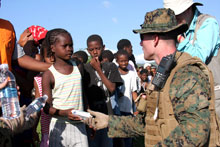 Before the MEU completed post-deployment leave after the 2009 deployment, a 7.0 earthquake shook the capital city of Port au Prince, Haiti, Jan. 12, 2010. The 22nd MEU was the first major Marine force to respond, managing the hardest hit area that spanned 65 kilometers west of Port au Prince. Less than one week after the initial earthquake, the MEU embarked a tailored force aboard U.S. Navy shipping and responded to the crisis on the ground. Initially, the MEU conducted immediate relief operations by distributing food, water and providing medical care. From February to March, the MEU transitioned to sustained relief operations and focused on turning over responsibilities to the Government of Haiti and major relief organizations ashore before departing at the end of March.
Before the MEU completed post-deployment leave after the 2009 deployment, a 7.0 earthquake shook the capital city of Port au Prince, Haiti, Jan. 12, 2010. The 22nd MEU was the first major Marine force to respond, managing the hardest hit area that spanned 65 kilometers west of Port au Prince. Less than one week after the initial earthquake, the MEU embarked a tailored force aboard U.S. Navy shipping and responded to the crisis on the ground. Initially, the MEU conducted immediate relief operations by distributing food, water and providing medical care. From February to March, the MEU transitioned to sustained relief operations and focused on turning over responsibilities to the Government of Haiti and major relief organizations ashore before departing at the end of March.
The MEU conducted a 10-month deployment from March 29, 2011, to Feb. 25, 2012. While deployed, the Marines and Sailors supported operations in U.S. European, African and Central Commands' areas of responsibility, including operations in Libya, training in Djibouti and bilateral training with Spanish and Romanian marines.
The MEU’s most recent deployment took place from Feb. 7 to Oct. 28, 2014. The MEU supported operations in U.S. European, Africa and Central Commands' areas of responsibility, including Iraq and Lybia and bilateral training in Spain, Portugal, Israel, Greece and Jordan.
During the deployment, the USS Bataan, with support from MEU Marines and Sailors, rendered assistance to 282 persons in distress at sea in the Mediterranean after receiving a report of a sinking small vessel.
Since its activation in 1982, the 22nd MEU has been awarded two Joint Meritorious Unit Awards, four Navy Unit Commendations, five Meritorious Unit Commendations, the Marine Corps Expeditionary Streamer with two stars, the Armed Forces Expeditionary Streamer with two stars, the Armed Forces Service Streamer with three stars, the Southwest Asia Service streamer with two stars, the Afghanistan Campaign streamer, the Iraq Campaign Streamer, the Global War on Terrorism Expeditionary streamer and the Global War on Terrorism Service Streamer.